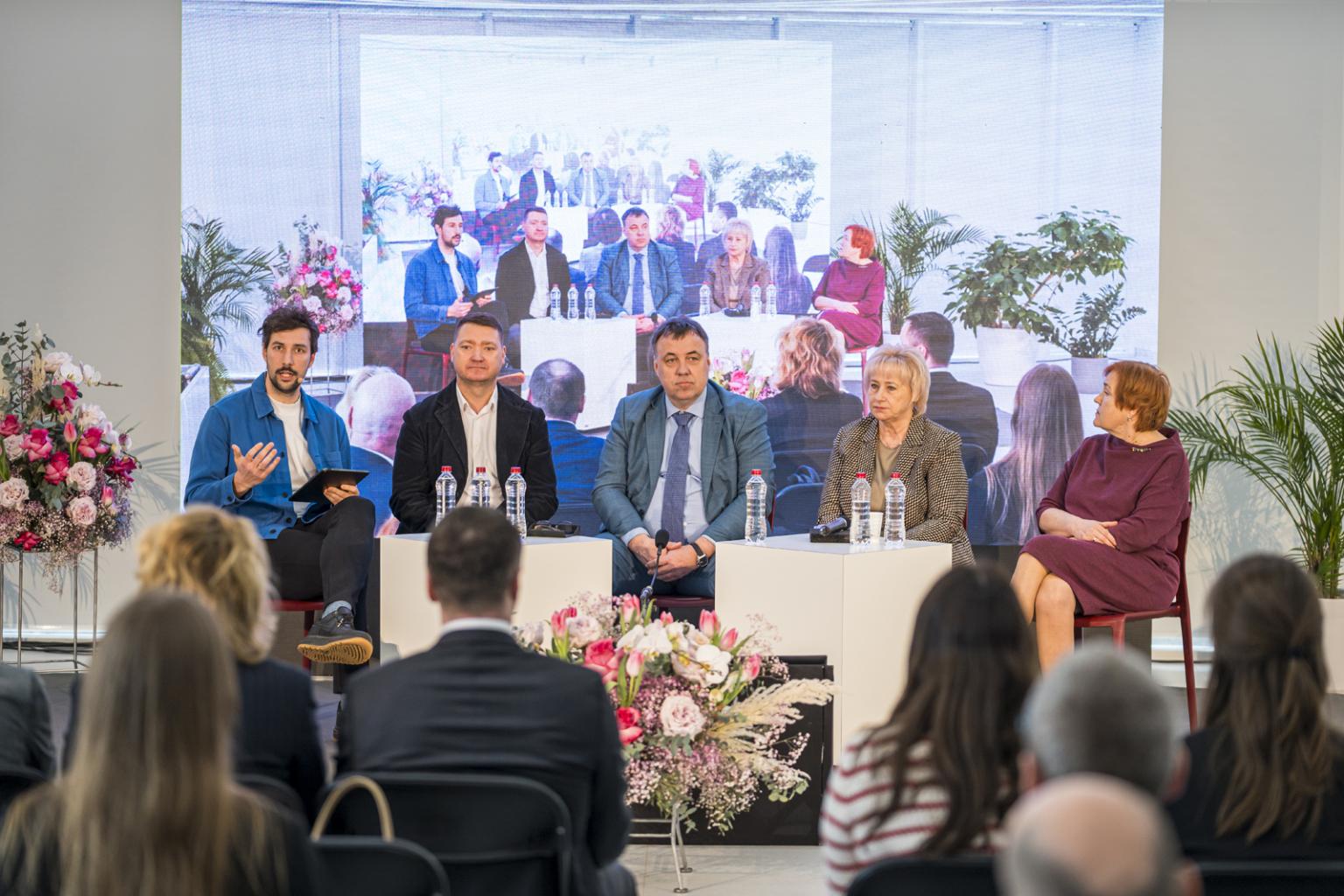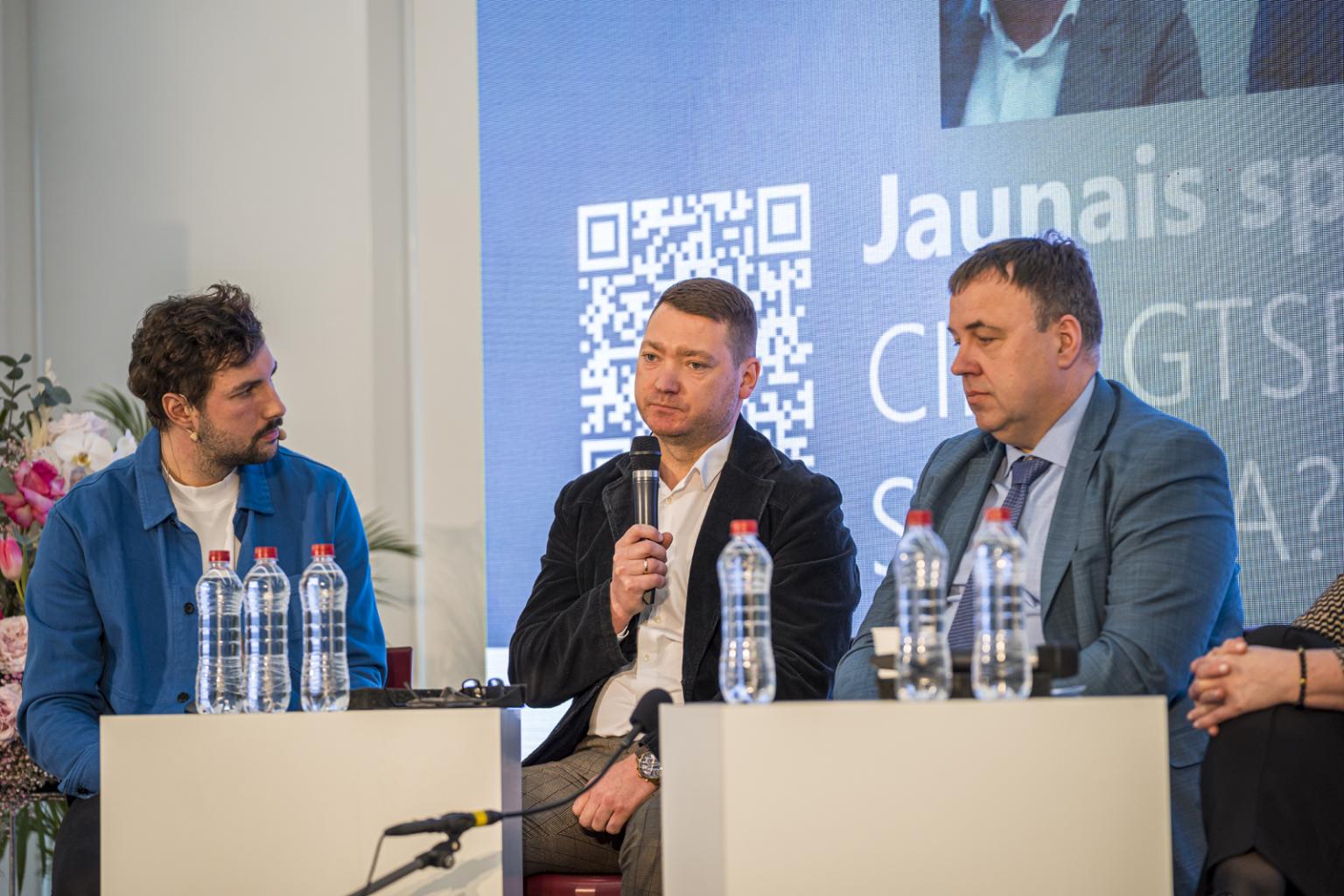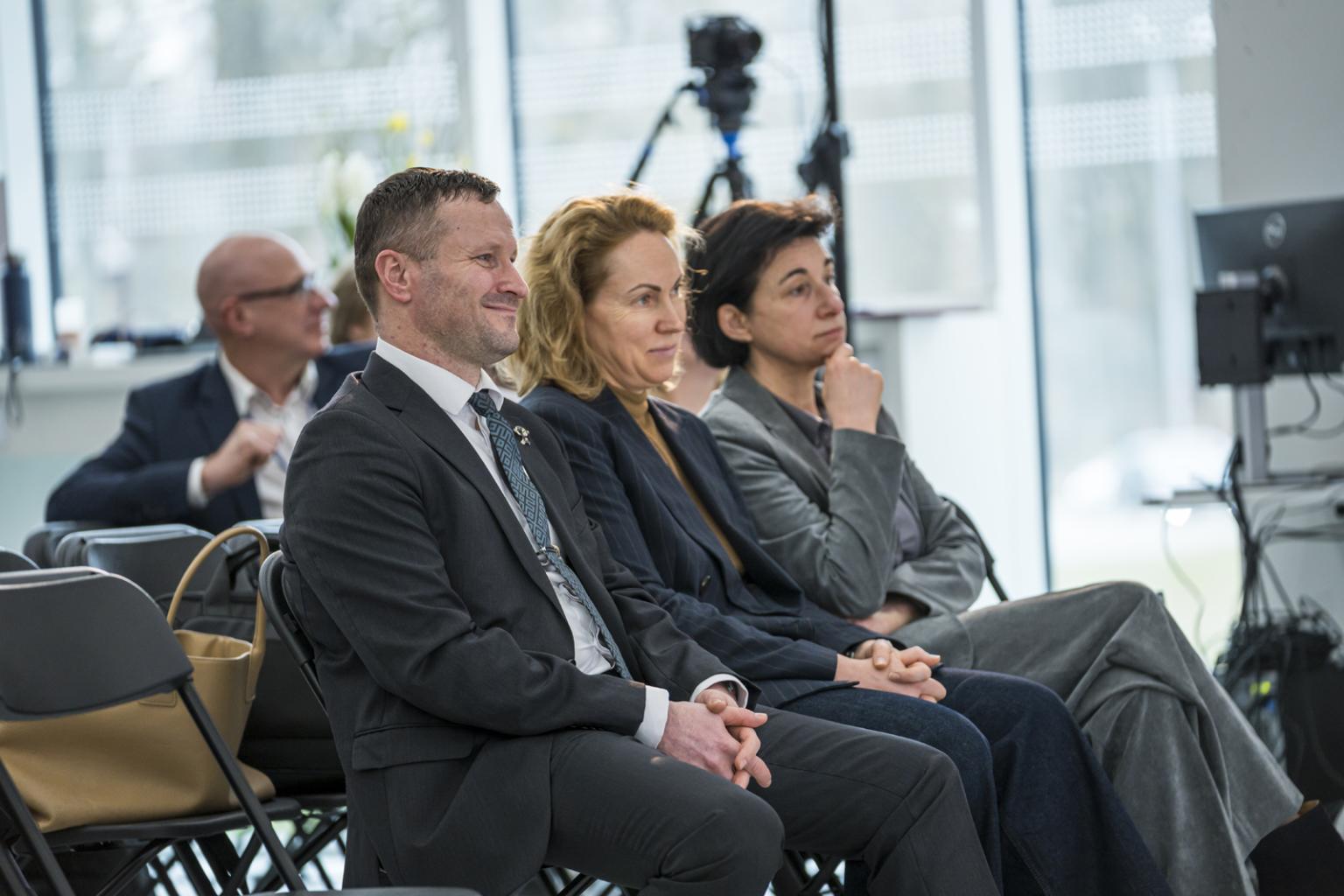Discussion on young athlete health monitoring and sports system sustainability highlights urgent need for action
As part of Rīga Stradiņš University (RSU) Research Week 2025, a discussion was held on ‘The young athlete in Latvia: how sustainable is our system?’. Leading experts from the sports industry analysed the challenges facing Latvia’s sports system and discussed the necessary reforms to ensure stable and sustainable development opportunities for young athletes and their coaches.
Panellists
- Edgars Pukinsks – Advisor to the Prime Minister, responsible for development and change management in cross-sectoral matters, primarily related to education, sports, health, and business environment development. Former Secretary General and Head of Administration at the Latvian Football Federation;
- Aleksandrs Samoilovs – Director of the Sports Department at the Ministry of Education and Science;
- Raimonds Lazdiņš – President of the Latvian Olympic Committee;
- Juris Zīvarts – Senior Consultant at the Office of the State Secretary, Ministry of Education and Science;
- Diāna Zaļupe – Chair of the Latvian Sports Education Institutions Directors’ Council;
- Baiba Norīte-Lapsiņa – Head of the Sports Medicine Centre at the Children's Clinical University Hospital;
- Normunds Vārpa, PhD – Researcher in the National Research Programme ‘Sports’, IMRSportsLV project; Lead Researcher at RTU Liepāja.
 From the left: moderator Rihards Ginters, Normunds Vārpa, Raimonds Lazdiņš, Diāna Zaļupe, and Baiba Norīte-Lapsiņa
From the left: moderator Rihards Ginters, Normunds Vārpa, Raimonds Lazdiņš, Diāna Zaļupe, and Baiba Norīte-Lapsiņa
The discussion was also attended by a broadly represented audience, bringing together industry experts, policy makers and sports specialists, the management and professors of RSU LASE, project researchers, and students. Among the attendees was Vladimirs Šteinbergs, the newly elected President of the Latvian Sports Federations Council, along with other distinguished attendees.
Key conclusions
- Insufficient funding for sports schools, with no significant changes since 2014;
- Gaps in coach education, including outdated or inadequate training programmes and unclear criteria for professional qualification levels;
- Challenges in youth health monitoring, stemming from the absence of a unified approach, limited capacity, and lack of transparency within a centralised digital system;
- Absence of a strategic vision, which hinders process improvements at the national level.
The participants were unanimous in recognising that the children’s and youth sports system faces several significant shortcomings, which require both immediate short-term interventions and long-term legislative amendments – particularly in the Sports Law and the Cabinet Regulation No.77 Regarding the Procedures for the Certification of Sports Specialists and the Requirements Specified for a Sports Specialist.
Normunds Vārpa, a representative of the National Research Programme ‘Sports’ IMRSportsLV project and lead researcher at RTU Liepāja, emphasised that the system has too many gaps, both in legislation and in the organisation of processes.
He pointed out that the experts involved in the discussion agree on the need to engage all stakeholders and improve processes for the sustainable development of the sports sector, rather than relying on the integrity of individual sports professionals. ‘Currently, the sports system lacks a shared responsibility and a consistent approach. For example, in the monitoring of young people's health, shortcomings have been acknowledged for years, but the changes are very slow,’ Vārpa continued.
 Ginters, Vārpa (centre) and Lazdiņš during the discussion
Ginters, Vārpa (centre) and Lazdiņš during the discussion
On the specialisation of coaches
A similar situation can be observed in coach education. Assistant Professor Mg. paed. Inese Ļubinska, Head of the Sports study field at RSU Latvian Academy of Sport Education, emphasised the need to revise the procedure for awarding coach qualifications as outlined in the Cabinet Regulations, in order to encourage greater motivation for deepening knowledge and fostering professional development among sports coaches. As part of the consolidation of both universities, new coach study programmes are also being developed at RSU LASE, offering opportunities to address the challenges identified so far and to strengthen the development of the sports sector.
‘We cannot equate a coach who has studied at university for four years and expanded their knowledge through a master’s or doctoral degree with a coach who has acquired basic coaching skills over the course of just six months,’ Ļubinska pointed out. ‘Category C coaches are necessary, but their status should be more clearly defined in the Cabinet Regulations. They are sports instructors or assistant coaches, rather than fully qualified coaches. At the university, we emphasise that a coach is not only a sports specialist but also a teacher, who must be able to work with different age groups and be a skilled educator. A clear specialisation for coaches and an interdisciplinary approach are fundamental to high-quality education and sports development.’
‘At the moment, there are significant deficiencies in the coach certification system, which affect not only the development of young athletes but also the overall quality of sports,’ Ļubinska emphasised. ‘We cannot afford to waste time – we must ensure a clear structure and professional requirements for everyone who works with athletes. In the academic environment, we particularly highlight that a coach is also an educator, who must possess knowledge not only of sports methodology, but also of teaching principles. Our responsibility is to create an environment where knowledge, experience, and competence are systematically assessed and developed.’

RSU LSPA direktora p. i. asoc. prof. Kalvis Ciekurs, direktora vietniece Ināra Laipniece un doc. Inese Ļubinska (no labās) diskusijas laikā
The panellists also stressed the role of the Ministry of Education and Science, emphasising the need for a clearer strategy and coordinated action to implement reforms in cooperation with the Latvian Sports Federations Council, the Latvian Olympic Committee, and other key strategic partners in the industry.
What’s next?
The panellists hope that further changes to the policy and the new Sports Law will reinforce the principle that the national priority should be a healthy and well-rounded young person, rather than early specialisation.
The event clearly demonstrated that change is inevitable, and for it to occur, clear cooperation must be established between coaches, sports organisations, and state institutions. The panel discussion featured at Research Week was an important step towards achieving this goal.
To stay up to date with project news, you can subscribe to the newsletter. A mid-term conference is scheduled for the autumn, which will feature both a presentation of the initial studies and a more in-depth exploration of the issues.
This discussion followed the first meeting on issues and future trends in the training of sports specialists in Latvia, which was held on 8 October 2024 at Rīga Stradiņš University (RSU).
A national research programme is a public contract designed to conduct scientific research in a priority sector, with the aim of generating new knowledge, skills, and innovations. It supports both high-quality fundamental research and policy makers by providing evidence-based recommendations for policy development.
The project ‘Innovations, methodologies and recommendations for the development and management of the sports sector in Latvia’ (VPP-IZM-Sports-2023/1-0001) is being implemented by researchers from Rīga Stradiņš University (RSU), including the RSU Latvian Academy of Sport Education, the University of Latvia, and Riga Technical University (RTU), including RTU Liepāja Academy. It is funded by the Ministry of Education and Science’s National Research Programme ‘Sports’. The project competition is organised and managed by the Latvian Science Council, which provides international external expertise in project evaluation and programme management. The project will run until the end of 2026.





